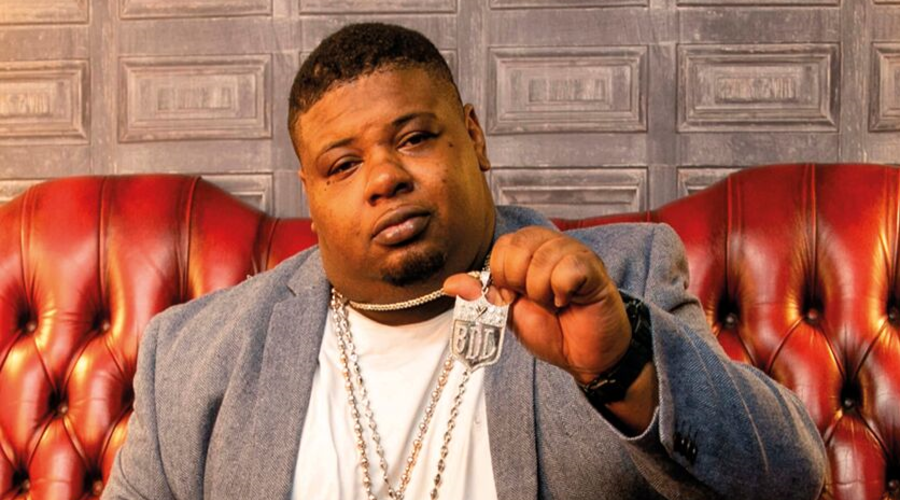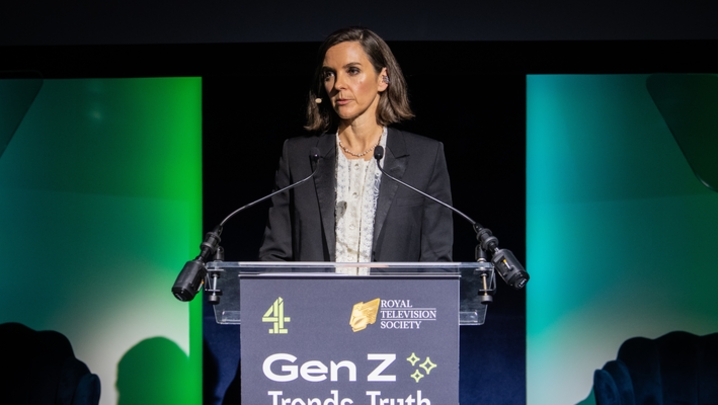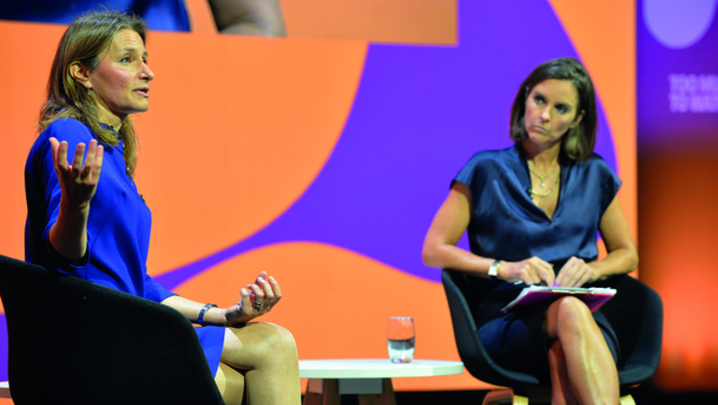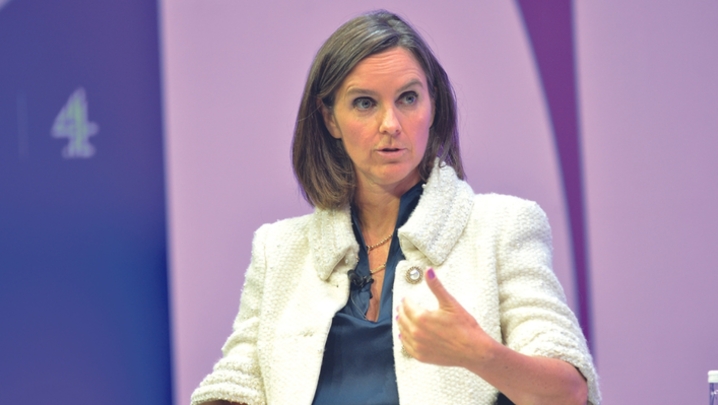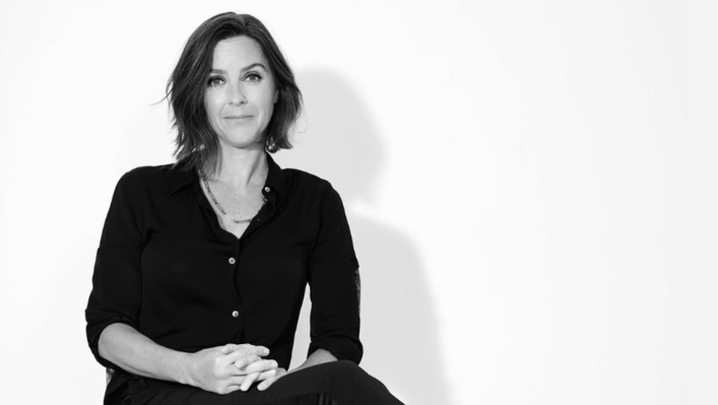Alex Mahon argues that the broadcaster’s role is crucial during a time of disruption. Maggie Brown reports
If Channel 4 was being set up for the first time today, “you would not plonk it in SW1,” observed Alex Mahon, its newish Chief Executive. She explained that she had an advantage coming in fresh to the London-based broadcaster in October 2017, when it needed a deal with government on a new national HQ and dispersing jobs to the regions.
“I went back to basics and asked what would be right for us in terms of public service broadcasting, the remit, and the strategy. If you are there to represent the whole of the UK, appeal to diverse audiences that are not being reached, [setting up in London] would be bonkers.”
She said the Brexit vote had also influenced the broadcaster’s strategy, because “we know London called it wrong. So part of this is about us representing the UK, spending money outside of London” and employing 300 people in new centres.
Mahon added that there was also a commercial advantage. Hiring specialist staff outside the capital should be easier, especially the engineers and IT people who are expected to develop Channel 4’s digital platform.
It was also an opportunity to change the employment mix and promote social mobility: it would mean “recruiting many more people out of London, bringing our apprentices through”.
Channel 4 was dubbed the poshest of the UK broadcasters in a detailed study by the London School of Economics, commissioned by the broadcaster and published at August’s Edinburgh International Television Festival.
London is seen as an unattainably expensive destination by many.
But Mahon did not play down the challenges of splitting up the broadcaster: “It is a big change for us. We are only 850 people, so it’s about ensuring the organisation stays stable, because it is not an easy thing to do, nor easy for my staff.
“It will definitely force us to do many things that we might not have done in one building. We are not particularly agile in the way we work… as you can just run between floors.… It will make us modernise the business, which we might not otherwise have done.”
Challenged by her interviewer, Tim Hincks, as to whether she was Channel 4’s “change candidate”, Mahon said that she was attracted by places where change was needed.
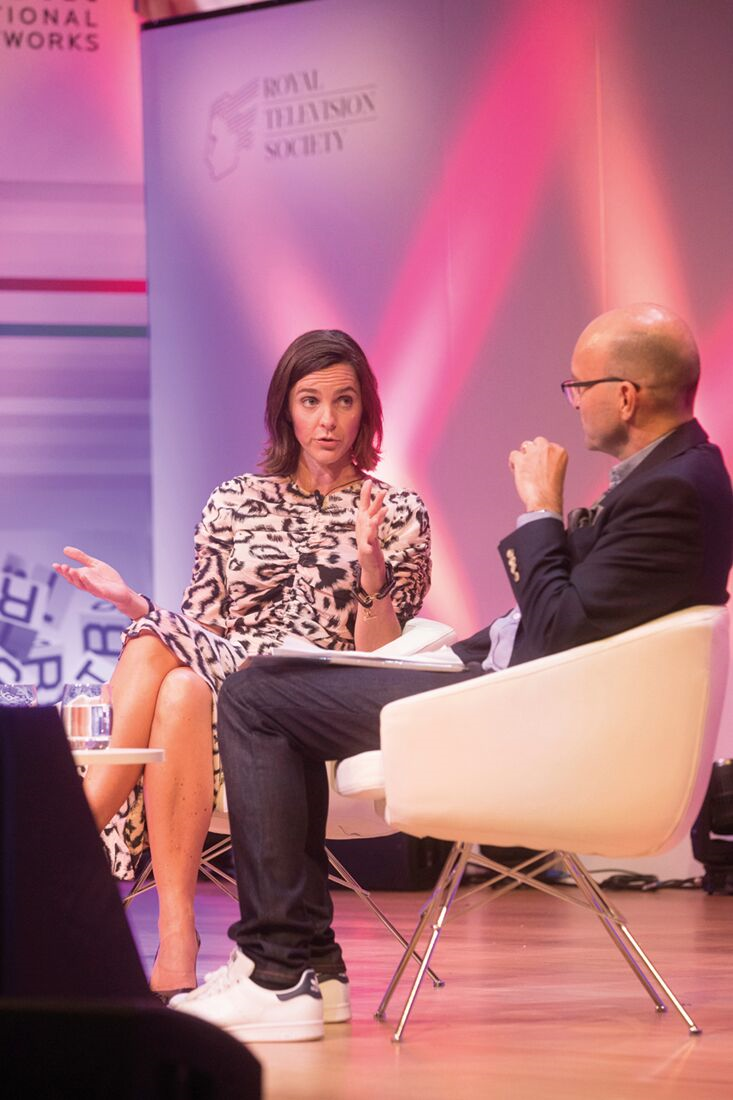
When she was running the production company Shine, “there was huge growth in the sector, it was amazing and fun.… You could ask, why go into broadcasting at a time when linear broadcasting is under threat? The environment is changing… and that makes it really interesting.
“For me, the amazing thing about Channel 4 [is that] it feels more important than it ever was.
"Basically, we live in a divided nation, so the channel possibly has a more important position in society than it did even in 1982.” The broadcaster’s properly resourced and independently regulated journalism was another key draw for her."
She continued: “Before I started, I went and talked to all the people who had held the [CEO’s] post before, and they all said they felt a tremendous responsibility to make sure Channel 4 was safe at the end of their tenure.
“It was very different to a commercial thing. Everyone made the same comment that they wanted to carry it forward to the next stage. It is about making enough change to grow if we possibly can [within its niche]. For all companies, that is more difficult than it has been before.”
She added: “In this quite crowded landscape we can’t be the everything shop. We can’t be the Netflix, we don’t have that money.
"So, it has to be about being really clear about having sharper flavours, dialling up what you stand for; which means some things in the middle have to disappear.
“We have to have the fresh, the original, the noisy and the anarchic. That’s what people expect, as well as the commercial things. The Big Narstie Show on Friday nights – only Channel 4 would run that.
“It has to be about increasing our reach in diverse audiences.
""Channel 4 is still the youngest [by demographics] broadcaster, so the question as we move into the digital world is: do we still make an impact with those people? Channel 4 is, at its heart… the youth-skewing PSB.
“We see that as a fundamental part of what Channel 4 was set up to do, and I don’t think we should give up on that at a time of debate about bringing society together.”
Mahon explained that, when bringing new shows into the schedule, trying to grow them, or finding new talent, the focus was on young audiences. But C4 always had to balance that with commercial imperatives, such as attracting older ABC1 viewers.
The rise of streaming services and the internet giants meant that all broadcasters had to sharpen up.
“We [have to] operate faster, without the smugness of thinking, because you have a licence, you can take time.
“You also have consumers consistently saying that [on] Netflix, they don’t know what to pick. Linear broadcasters do have the power of marketing and prominence – it’s a massive advantage to have.”
The crux was how to exploit that advantage – something that she was thinking hard about.
Asked about the newly minted relationship with Sky (which involves sharing certain Formula 1 rights and exchanging some drama series), Mahon said it was an opportunity to increase audience reach.
“Ten years ago, other broadcasters were seen as the enemy. I’m not thinking like that now.”
Mahon had less to say about whether the BBC, ITV, Channel 5 and Channel 4 might combine in a UK Netflix-style service.
She confirmed only that everyone was talking to each other about possibly collaborating – but each organisation had its own motives.
“What you do see is consumers having faith in public service broadcasting”, she said, so the question was how to enhance that belief.
Increasingly, the PSBs were working together on regulatory issues and lobbying. This included the campaign to safeguard the prominence of their programmes on both EPGs and voice-controlled devices.
“We have [given] speeches to Parliament and different government departments, asking what prominence looks like in a different environment. What it means, for example, on voice search for news, when you might get Russia Today as news when you open a smart TV.
“These are complex debates but I think there is a groundswell of support for it now, compared with a few years ago. That is good.”
In Session Nine, Alex Mahon, CEO of Channel 4, was interviewed by Tim Hincks, Co-CEO of Expectation Entertainment. The producers were Sue Robertson and Martin Stott.

